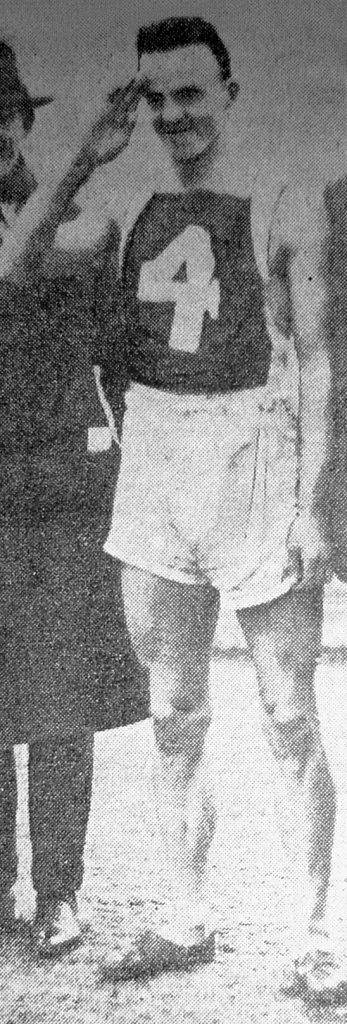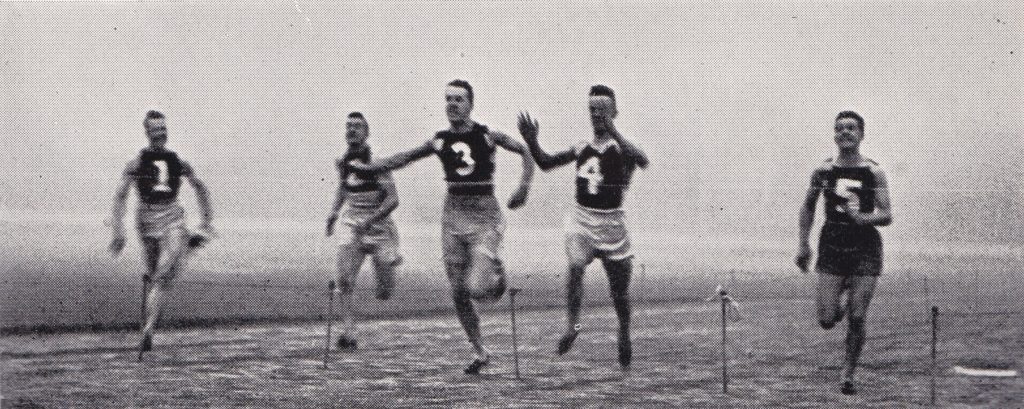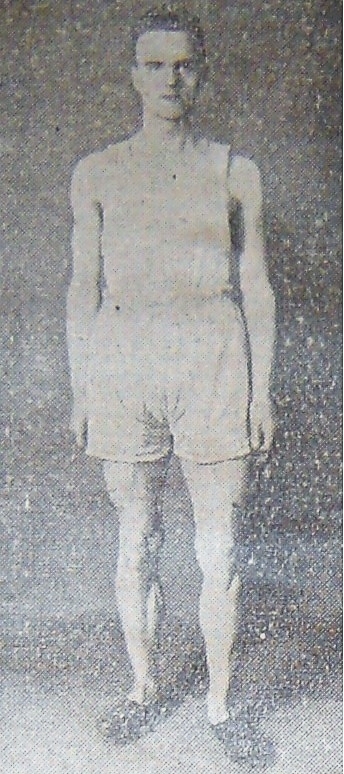Jimmy Duffy (1903-1976)
Unsung hero of the running track
The period from 1920 to 1932 was the Golden Age of British half-miling, an epoch during which Britons claimed a remarkable FOUR consecutive Olympic 800-metre titles: Albert Hill at Antwerp in 1920, Douglas Lowe at Paris in 1924 and again in Amsterdam in 1928; and, finally, Tom Hampson at Los Angeles in 1932, where he became the first human to breach the 1 minute 50 second barrier for the two-lap distance.
The dominant force in 1920’s British half-miling was indisputably the Cambridge Blue Douglas Lowe, who single-handedly lowered Albert Hill’s British 800-metre record from 1 minute 53.4 seconds to 1 minute 52.4 seconds in 1924, and then to 1 minute 51.8 seconds and finally to 1 minute 51.2 seconds in 1928.
In 1925, however, the dazzling brilliance of Douglas Gordon Arthur Lowe was very nearly eclipsed by a little-known coal miner from Broxburn.
It can be said without a shadow of a doubt that the best Scottish half-miler of the 1920’s was NOT Duncan McPhee, William Milligan, Charles Mein, Robert Downie, Tommy Riddell, William Seagrove or Hugh Maingay – all of whom were decorated sub-2-minute performers.
It was Bernard Rodden, alias Jimmy Duffy.
Duffy was born at Uphall, Linlithgowshire, on 13 September 1903. His father, Hugh, was a paraffin refiner at the Uphall Oil Works. Those were the days when shale oil and gas were thought to be anything but harbingers of ecological disaster.
This Jimmy Duffy is not to be confused with the Jimmy Duffy of Boston Marathon fame who emigrated from Edinburgh to Canada in 1911 and met his untimely end four years later on the battlefields of Belgium. Or the late J. (Jock) Duffy, the bricklayer who won the 1953 S.A.A.A. Marathon Championship and, like Duffy, was born at, yes, you’ve guessed it, Uphall near Broxburn.
Having grown up in needy circumstances during the First World War, Duffy began competing in boys’ races as a stripling of 12 years. His younger sibling James followed in his footsteps and became a successful long-distance runner in the early 1920’s under his alias “R. James (Linlithgow)”.
After making his big-time debut in the 1919 New Year Pedestrian Gala at Powderhall, where he was unplaced in the 3-mile race for under-16 boys, he first hit the public eye in 1921 when he won the June half-mile handicap at Powderhall off 55 yards in 1 minute 59.4 seconds. At the end of the year, running off 50 yards, he finished 3rd in the final of the £80 Powderhall Christmas half-mile handicap, having just failed to make up 35 yards on the two men ahead of him. His time of 1 minute 53.0 seconds, worth a little over 2 minutes for the full distance, was a notable performance on a heavy track.
Little was heard of Duffy in 1922, a circumstance which may have had something to do with the fact that his handicap had been slashed to 20 yards as a penalty for his performance at Powderhall. In professional athletics excellence was penalised, not rewarded!
Duffy finally hit his stride in 1923 when he broke the 2-minute barrier for the first time, posting a superb 1 minute 57.8 seconds at Powderhall on June 1 and backing this up with another sub-2-minute clocking at Powderhall on September 1. At the end of the year, he established his supremacy among the professionals in the half-mile when he put up a sterling performance to win the Christmas half-mile handicap at Powderhall from 25 yards in 1 minute 53.6 seconds. This was remarkable running in the middle of the grim Scottish winter and hailed then as one of the greatest performances Powderhall had ever seen.
For the next half dozen years, Duffy was to be regarded as the benchmark for the half-mile in Scotland. Until 1930, all half-mile handicaps at Powderhall were framed from Duffy at scratch.
Duffy was not only a stylist like all greats of the running track but also an exceedingly versatile runner, possessing both the flat speed sufficient to mix it with Scotland’s best pro sprinters and the stamina to run the mile in 4 minutes 28.4 seconds off 15 yards at Powderhall on May 12, 1923.
In 1924, Duffy saved his best for a Charity Gala at Powderhall on 7 June, where he took on a large field from the scratch mark. Unfortunately, the curse of the scratch man struck again, as it so often did. He had to run wide most of the distance and was baulked more than once as he picked his way through the competitors starting ahead of him. Still, he pulled off an impressive run, coming within a foot of victory in 1 minute 58.6 seconds on a soggy track.
Most of his numerous appearances during the summer months were untimed runs at the Highland Games, where he invariably did no more than was absolutely necessary to win. In any case, the running tracks used at such annual gatherings were typically rudimentary and temporary circles staked out in grassy fields with a wholesome irreverence for accuracy.
In the summer of 1925, the Broxburn runner attempted the world professional half-mile record at Shawfield. The record had for over a half a century been in the possession of one Frank Skurry Hewitt, a Londoner by birth, who, after emigrating to Down Under, was credited with a time of 1 minute 53.5 seconds at Christchurch, New Zealand, in 1871. This mark had eluded the world’s best professionals ever since, including the three-time “three A’s” half-mile champion Edgar Bredin, who, after turning professional, set the then standing British record of 1 minute 55.6 minutes at Stamford Bridge in 1897. With the aid of pacemakers and cheered on by a bumper crowd of 12,000 spectators, Duffy romped to victory in 1 minute 53.0 seconds, shattering the age-old figures. The celebrations were short-lived, however, as a re-measurement of the quarter-mile oval revealed that it was 2 feet short, and, hence, he had run 4 feet, or 1.2 metres, less than the full distance. That was still more than 800 metres (803.45 metres, to be exact), and his time, while not a professional half-mile record, is equivalent to a freakish 1:52.5 for the 800 metres – only 0.6 seconds shy of the world amateur (and outright) record set by the American Ted Meredith at Stockholm in 1912 and a mere 1/10th second off the British amateur record set by Douglas Lowe when winning Olympic gold at Paris a year earlier. Would the track at Christchurch where Hewitt set the world record have stood up to such scrutiny? It was a moot point by then, of course.
Duffy went to the well a few more times that year in his quest to rewrite the record books. It is worth pointing out, though, that even if he had been credited with a world record at Shawfield, his performance might not have been recognized by statisticians owing to the circumstance that he had been paced throughout the last stage of his race – a big no-no, even in professional circles. On August 15, he was timed at 1 minute 55.0 seconds in a handicap at Powderhall Ground, thereby establishing a bona-fide British professional record. On 18 August he only managed 1 minute 57.0 seconds in another record attempt at Shawfield, and it seemed that he was running out of steam. But he bounced back to lower the record by a whole second to 1 minute 54.0 seconds at Wick on August 26, and then conjured up another marvelous effort of 1 minute 54.4 seconds over 875 yards (800.1 metres) at Powderhall on October 3. Alas, despite his best efforts, the world record was not to be.
Duffy was not exactly the epitome of your law-abiding citizen, and there were a few deviations from the straight and narrow along the way. He was convicted of theft twice in his younger years. But at least on the running track, he always gave an honest account of himself, even when the odds were stacked against him. A contemporary noted that he possessed “great strength and courage and never knew when he was beaten, snatching victory on the tape on many occasions when all seemed lost”. On October 31, 1925, he had to be hospitalised after collapsing from exhaustion in a handicap at Powderhall, where, as the backmarker, he had been set a hopeless task.
One of the easily overlooked highlights of the 1926 season was Duffy equalling his British record at Perth on July 24 when he won the half-mile handicap from scratch in 1 minute 54.0 seconds despite conceding mouth-watering starts of up to 85 yards. Seven days later, in a professional sports meeting promoted by the management of Clyde FC at Shawfield, Duffy returned another brilliant performance in front of 20,000 spectators to win the half-mile handicap from the back mark in 1 minute 55.0 seconds. By now, expectations were so high that the Sunday Post ran a piece disappointingly titled “DUFFY FAILS AT SHAWFIELD.”
On September 3, 1926, Duffy gave a demonstration of his blazing flat speed when he outclassed Frank Schultz of Australia to win the World Professional Championship at Shawfield, returning 49.67 seconds for the distance. This was not electronic timing, of course, but a time taken manually with one of the state-of-the-art 1/100-second stopwatches that had first surfaced in the UK around 1921. His performance, equivalent to 49.4 seconds for the metric distance, was a leading mark in the UK and, in fact, fractionally quicker than the winning time at that year’s A.A.A. championships.
The 1927 season saw Duffy heavily handicapped (a victim of his own success) and struggling to get placed, let alone win, in his favoured events. But rather than bowing to fate and the perceived ignominy of being an also-ran in handicaps, he increasingly turned to the short sprints – with surprising results. On January 2, 1928, he confounded the critics when he carried off the coveted 130-yard Powderhall New Year Sprint Handicap from 11 ½ yards in 12 4/16th seconds – a performance worth 11.3 seconds for 100 metres on a bumpy grass track in bitterly cold conditions.
Duffy was one of the few runners to win both the Christmas half mile and the New Year sprint handicaps. The Broxburn runner excelled at all distances, and it was confidently asserted that had he put his mind to it he could also have cut a good figure in the Powderhall Marathon.
Half-miler Jimmy Duffy caused a sensation in 1928 by winning the Powderhall Sprint
In around 1930 Duffy announced his decision to hang up his spikes, demoralised and convinced that there was no money in the game. Like many champions before him, he was finding little hope of competing with success in handicap events, with scratch races having become few and far between after the demise of the cinder track at Powderhall. He reconsidered, thankfully, and briefly returned to the spotlight in 1934 when he bagged the World Professional Half-Mile Championship in 2 minutes 1.2 seconds at Hackney Wick Grounds in London. Film of him doing it is at the link below.
For close on twenty years, Jimmy Duffy toured the Scottish games circuit, winning hundreds of handicap races at all distances at meetings from Royal Braemar to Jedburgh. He was a real crowd-puller who loved to entertain – and, of course, to win. A contemporary marveled at the poetry of his motion: “He ran effortlessly with a flowing action which was thrilling to behold”.
After his retiral in 1939 (he did not so much retire as fade away), Duffy maintained an interest in athletics and for a time coached the Edinburgh University and Edinburgh Southern Harriers track teams. His proteges included two S.A.A.A. half-mile champions in Cyril Hall, Edinburgh University, and Jimmy Smart, Edinburgh Southern Harriers, before taking his talents to distant Calgary in Canada.
In 1949 he appeared in the Veteran’s Handicap in the New Year Pedestrian Gala at Powderhall. It is not known how he fared, but, knowing Jimmy Duffy, he would have been out to win it.
This unsung hero of the running track was, in the words of a pundit, “the greatest middle-distance runner produced by Scotland in the years between the wars and one of the greatest of all time”. So there you have it.


